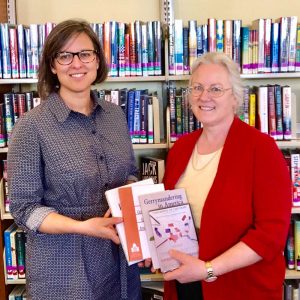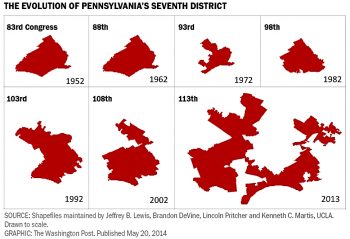By Nathaniel Smith, Columnist, The Times
 Recently I spoke with Kate Young about Fair Districts PA https://www.fairdistrictspa.com/ and its campaign to do away with gerrymandering in Pennsylvania. Several Fair Districts presentations this spring have generated great interest. West Chester Public Library didn’t have materials on gerrymandering in its collection, so Fair Districts PA donated three books and a DVD to support the continuing education of the community.
Recently I spoke with Kate Young about Fair Districts PA https://www.fairdistrictspa.com/ and its campaign to do away with gerrymandering in Pennsylvania. Several Fair Districts presentations this spring have generated great interest. West Chester Public Library didn’t have materials on gerrymandering in its collection, so Fair Districts PA donated three books and a DVD to support the continuing education of the community.
Why did you decide to put time and energy into this particular issue?

Kate Young (left), Fair Districts PA Chester County Coordinator, making a recent presentation of books on gerrymandering to West Chester Public Library’s director Victoria Dow.
After the November election, I was looking for a non-partisan good government issue to work on, and the bad redistricting process in our state explains why many people think their votes don’t matter here. Over the years, the party in power has drawn districts to their own advantage and to the detriment of democracy.
The first meeting I attended to learn about gerrymandering had 12 guests registered. When I arrived at the Ludington Library in Bryn Mawr, the room was already full and people were sitting on the floor. There has been national concern on the redistricting process since after the 2000 census. My mother, former 156th district representative Barb McIlvaine Smith, was working against gerrymandering ten years ago. A few other states like California have moved to a neutral citizens commission; PA can’t wait another ten years to do that.
What’s your own role?
I’m the lead coordinator in Chester County; most other Pennsylvania counties have someone in that position. I got into it by asking the state leader, Carol Kuniholm, if she could set up presentations in Chester County like the one I had attended in Bryn Mawr. I helped promote a talk sponsored by the League of Women Voters for 100 guests at the Exton Library. We had to turn away 65 people for lack of room; then I organized and promoted a second talk at Henderson High School that drew 600 people in February.
Now I lead a team of volunteers in Chester County. The next opportunity to hear Carol speak will be at Unionville High on May 11 at an event organized by a neighborhood group in East Marlborough. Another speaker that night will be 158th district representative Eric Roe, who will be introducing House Bill 722, establishing an independent citizens commission for redistricting.
How does redistricting affect the public?
Districts in PA are now drawn by party leaders to create safe incumbent districts. So the public is not really able to choose its representatives freely and total votes for a given legislative office statewide are not reflected in the party distribution of winners. Voters want candidates and competition.
Lawmakers should follow the state constitution wording: compact and contiguous districts that don’t cut municipalities. After the 2010 census they tried to divide West Chester Borough between two PA House districts, but finally were stopped in court.
This problem affects businesses too. A district that stretches from West Chester over to Lancaster or Lebanon County is excessively disparate in areas like agriculture, tourism, zoning. Local businesses need representatives who understand their needs and are part of the local community.
It affects citizen access as well. US Congressman Ryan Costello has noted that his district, CD 6, is so spread out that it’s hard to have an in-person town hall. But he draws the wrong conclusion in saying that you can’t take the politics out of redistricting. You can—you can end the current system where the beneficiaries of the process control the process.
Is gerrymandering a concerted effort or just random actions in different places?
Gerrymandering, the manipulation of district boundaries to benefit one party, actually goes back to the 1800’s, but it is only recently that mapping software and data mining have allowed legislators to proceed with precision to cut through neighborhoods, divide communities, and produce today’s octopus-like congressional districts.
Yes, it is a conscious, concerted effort. Karl Rove, regarding the 2010 redistricting, said that he who controls the maps controls Congress. He started the REDMAP project to insure his own party’s control.
Democrats do it too. They’ve established a counterpart to REDMAP called Advantage 2020. You can see gerrymandered districts in Maryland that were drawn by Democrats. In PA, Democrats will have the advantage after the 2020 census, under the current system, because they now control the PA Supreme Court, which often appoints the 5th member of the redistricting commission. That is incentive for Republicans to favor the citizens commission plan.
Gerrymandering can even cut disfavored incumbents or challengers out of their own district. The map of PA congressional district 16 over time shows clearly the increasing lengths that legislators have resorted to in order to protect the seat of then-incumbent Joe Pitts, a resident of East Marlborough, a tiny outpost stuck onto CD 16.
Ultimately, gerrymandering undermines the fundamental principle of our democracy: one person, one vote. We need enough legislators of both parties to see this is as a question of good government.
What is the concrete goal of Fair Districts PA?
The goal is to pass a state constitutional amendment to appoint an independent citizens redistricting commission.
We want to ensure compact districts that represent the community of voters. We should be voting with people who live near us. The current system allowed for Reading to be carved out of Berks County, which lies mostly in Congressional Districts 6 and 7, and connected by an umbilical cord to Lancaster County, which is mostly in Congressional District 16.
Montgomery County is divided among 5 Congressional Districts http://www.montcopa.org/DocumentCenter/View/7086 ; and none of those representatives resides in Montco. This is terrible for Montco residents, because it fractures their sense of community and dilutes their voices. Chester County, similarly, has fragments of 3 districts and only one resident congressional representative.
Right now we are working to secure resolutions of support from the County’s 73 municipalities. Two have passed, in Kennett Square Borough and Kennett Township; thirteen more have a vote scheduled. 53 have teams at work; we are looking for leaders in the remaining municipalities. Public support matters!
Why haven’t PA politicians dealt with the gerrymandering problem yet?
There are multiple bills addressing redistricting every session, but House Bill 722 and Senate Bill 22 are companion bills that Fair Districts PA helped draft. We believe they are the strongest bills addressing the problem of gerrymandering. Gerrymandering has reached a critical point across the country, and legislators and constituents alike are now aware of the problem and working to end it. California and Arizona have already adopted independent commissions.
The Electoral Integrity Project https://www.electoralintegrityproject.com ranks the US electoral process last among all Western democracies and ranks Pennsylvania third from the bottom in fairness of district boundaries. Only North Carolina and Wisconsin ranked worse. https://www.electoralintegrityproject.com/eip-blogs/2017/1/7/its-even-worse-than-the-news-about-north-carolina-american-elections-rank-last-among-all-western-democracies This made an impact on me, because those two states are actively and publicly involved in court cases about gerrymandering. The Wisconsin case is headed to the Supreme Court.

The Evolution of the 7th Congressional District, considered one of the most Gerrymandered districts in the nation by many election experts.
An article in Newsworks, “Academics rank Pa. near bottom of electoral integrity scale“ http://www.newsworks.org/index.php/local/politics/100060-academics-rank-pa-near-bottom-of-electoral-integrity-scale , gives the outline of PA district 7 as its prototypical example of gerrymandered boundaries.
This is an embarrassment that our elected officials need to deal with.
Has there been a racial aspect to gerrymandering in PA?
Probably not. The removal of Reading from CD 6, for example, was more partisan than racial. However, Reading tends to vote for Democratic candidates, and its population is among the poorest in the nation and increasingly Hispanic. Sometimes it’s hard to separate racial discrimination from economic or partisan discrimination.
What would happen if the PA constitution is amended as Fair Districts hopes?
There would be more electoral competition; candidates would not be running unopposed, as happens today in some parts of the state. Voters would have a real choice. It is very hard to challenge an incumbent who benefits from gerrymandering.
What would happen if it isn’t amended?
Gerrymandering could continue to worsen. If Democrats control the maps in 2021, it could increase gridlock in Harrisburg, as has already happened in Washington. There is an unprecedented degree of obstructionism on both sides. When districts are safe, candidates need only appeal to their base, and they are incentivized to appeal to the more extreme sides of their party.
Who would be on the commission and how would it go about its work?
The proposed amendment assigns 4 commission members to each of the 2 largest parties in the state, and 3 to others. No parties will be named in the Constitution; the seats are distributed based on the number of registered voters in a given party. It gives some influence to 3rd party members and Independents, who currently are left out of primary elections.
The amendment does not address how to draw district boundaries, because you can’t make two changes to the constitution in one bill. How the commission functions will be defined later. Iowa, for example, has a flat and homogenous topography that might be compatible with a grid-based system. Pennsylvania is crisscrossed with mountains, forests, and rivers that serve as natural community boundaries, and make it less likely that a grid will fairly and equally divide the state into districts.
Fair Districts PA leader Carol Kuniholm stresses that human input is needed. The goal isn’t necessarily square districts, but districts that are compact and contiguous as mandated by the PA Constitution.
Do you know how public opinion is running right now on the issue?
In Chester County, there is lots of support from all parties. Our push for municipal resolutions includes collecting signatures door-to-door. Many voters haven’t heard of gerrymandering, but when we explain it, voters want to sign. The gerrymandering issue is getting coverage from other states and we’ll get it here.
House Bill 722 will be introduced by prime sponsors Steve Samuelson (D-135) and Chester County’s Eric Roe (R-158). There are currently 45 co-sponsors signed on, with support from both parties, including Chester County Representative Carolyn Comitta (D-156). SB 22, the Senate version of the bill, is supported by 13 cosponsors from both parties, Chester County Senator Andy Dinniman (D-19) among them.
We are having a lobbying day on May 9, aiming for 3 to 5 constituents to visit each legislator in Harrisburg, wearing identical T-shirts to publicize our message. We hope to meet with elected officials then, and with staff in the district offices.
Do you have any predictions for how this campaign will turn out?
We are confident of municipal and public support; then it will be up to the legislators. We need the measure to pass both chambers before July 2018, and then again in 2019, in order to go to a referendum in time to change the redistricting method that will take place after the 2020 census.
We get a real sense of urgency and enthusiasm from voters. We are counting on our legislators to support good governance.






